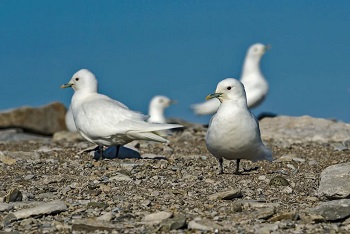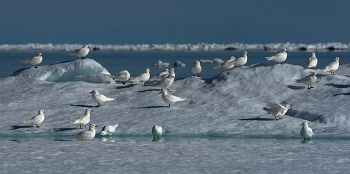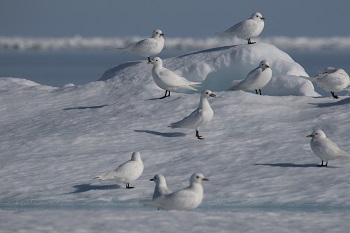Please activate JavaScript in your browser to use all interface options.
International Bird Day Celebrated on April 1
01 April 2021
Every year on April 1, International Bird Day is celebrated to coincide with the start of the birds’ return from their wintering grounds. The date was established to draw attention to the need to preserve the species diversity and numbers of birds in their natural habitat.
Environment protection is an integral part of the Company’s corporate culture and operation principles. Rosneft has been a member of the UN Global Compact for more than 10 years. In 2018, the Company confirmed its commitment to 17 UN Sustainable Development Goals, including goals No. 14 Life Below Water and No. 15 Life On Land.
In carrying out its activities, the Company does its utmost to conserve ecosystems in the regions where it operates and develops cooperation with scientific and environmental organisations to plan the most rational and effective solutions for conserving biodiversity.
 In 2020, the Company, jointly with the Arctic Research Centre (part of Rosneft Oil Company) and the Arctic and Antarctic Research Institute, launched a comprehensive study of the Ivory gull population, a rare bird species that is red-listed in Russia. This is the first time that such research has been carried out using innovative tools (camera traps, GPS trackers) and modern biochemical analysis methods.
In 2020, the Company, jointly with the Arctic Research Centre (part of Rosneft Oil Company) and the Arctic and Antarctic Research Institute, launched a comprehensive study of the Ivory gull population, a rare bird species that is red-listed in Russia. This is the first time that such research has been carried out using innovative tools (camera traps, GPS trackers) and modern biochemical analysis methods.
The expedition was conducted in the northeastern part of the Kara Sea on islands close to the northern part of Novaya Zemlya, the main habitat of the species. Ornithologists spent two months studying the nesting sites and the number of Ivory gull colonies. The expedition included aerial observations (from a helicopter, covering a total distance of 847 km, and using an unmanned aerial vehicle). During field trips, eight Ivory Gull colonies were surveyed and photo-recorders were installed. Ornithologists placed 7 GPS trackers, which provided unique data on the movements of the Ivory gulls. In addition, scientists ringed around 40 Ivory gulls and collected more than 70 blood, feather and food samples for laboratory analysis.
 They obtained unique data on the biology of the Ivory gull during the unfavourable season, which will improve the monitoring methodology and interpret the molecular genetic data. For the first time in Russia, high-resolution data on the movements and ice habitats of the Ivory gull have been acquired, which is essential for identifying key habitat areas of the species, forecasting population shifts in a changing climate and developing effective conservation measures.
They obtained unique data on the biology of the Ivory gull during the unfavourable season, which will improve the monitoring methodology and interpret the molecular genetic data. For the first time in Russia, high-resolution data on the movements and ice habitats of the Ivory gull have been acquired, which is essential for identifying key habitat areas of the species, forecasting population shifts in a changing climate and developing effective conservation measures.
The results of the research will be used to develop approaches to organise environmental monitoring of the species, develop measures to minimise impacts and ensure protection and conservation of habitats for the Ivory gull population.
Note for Editors:
The Ivory gull is a rare and protected bird species, which has been included in the Red Book of Russia since 1984, as well as in the regional Red Books of the polar regions of the Russian Federation. The Ivory gull lives permanently in the Arctic. It is also referred to as a feathered polar bear, as it is so closely associated with the high latitudes. Even the population size of the Ivory gull is comparable to that of the main polar predator and they often live side by side. The remoteness and inaccessibility of ivory gull’s habitat and nesting areas and uneven distribution through the habitat area affect fragmentation of information on the number of the species and its dynamics, territorial links and population structure.
Rosneft
Information Division
April 1, 2021

-315xx70.png)

